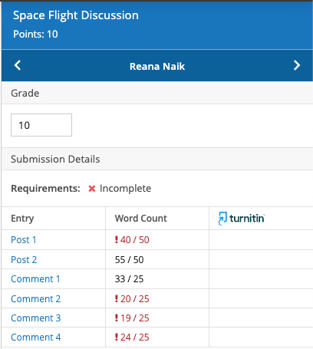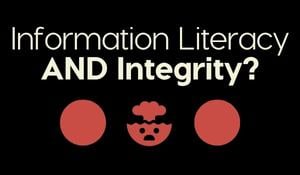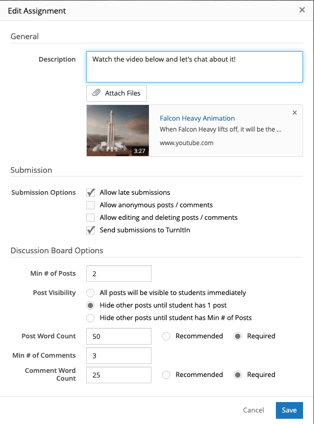Promoting information literacy and integrity in online discussions
Online and asynchronous classroom discussions can offer students valuable learning opportunities. Turnitin and ActiveClass bridge the challenges of meaningful discussions in online and asynchronous learning to promote engaging, accountable, and original conversations.
Discussion – proven and fundamental
Discussion as a learning activity is as old as learning itself. From Socrates to Sal Khan, the interactivity and presence captured by discussion have long been championed and celebrated.
Discussion serves as a principal intersection between distinct curricula encountered by distinct personalities. It’s an authentic and dependable avenue for testing and refining ideas. Through voice and ownership, it raises individuals and the community of learners through challenge, reflection, and exchange.
Discussion is as common—and as varied—as the classrooms in which it takes place. Even planned and scheduled discussions unfold dynamically and unpredictably. Participants drive the conversation naturally in ways that reflect their particular understandings, curiosities, and perspectives.
Discussions bring together diverse ideas and experiences. They foster growth by providing an opportunity to process information and put it right to work, rather than receive it passively.
Discussions also reflect the particular rapport of their participants. With successful facilitation and guidelines, they can promote considerate and respectful communication amid differences. In a world that seems increasingly polarized, it’s more important than ever to foster this kind of communication.
Reimagining discussion
Covid-19 forced a broad reconsideration in education, clearly demonstrating the need for new models and paradigms, as well as their potential value.
Online and asynchronous learning will continue to play an important role as schools and educators forge and define post-pandemic best practices. There’s a chance to reconceive what a class actually is and break traditional barriers that have limited education by default until now.
Through persistent class environments and social-media-like technology, students today can regularly connect with one another, share content, and exchange ideas in a comfortable and accessible environment.
Early on, educators sought to mimic the nature of in-class discussion with their online discussions. Some used strategies like “respond to one discussion question and one peer” for full credit. But online discussion has its own nature, as well as its own advantages.
“LMS discussions can be stagnant...they can do the job, but not very well. ActiveClass gives our students natural ways to engage in classes. We don’t want them to just be passive watchers.”
Sarah Ledoux
Harvard University, Manager of Instructional Technologies
Often, in person, some personalities can dominate conversations, and some students may not be comfortable putting themselves out there. The discussion misses their input. There may also be some who add to the conversation importantly but briefly, and their comments may not get the attention they deserve.
When the discussion ends, it ends. Participants may be able to remember some of what was said and leave with certain impressions, but some details may be lost or minimized. This is no one’s fault. It’s just human nature. Even educators’ recollection will be limited, which presents problems in fair evaluation and assessment.
Online discussions create space for different personalities, preserve ideas, and allow students critical time to consider and reflect. They also present new ways to interact that can be recorded and fundamentally measured in ways not possible in the classroom.
Online discussions can begin simply and with low stakes to build motivation. As students become more comfortable they can grow in complexity and weight. The possibilities are virtually endless.
At the same time, however, the abundant information and technology of today present new friction points for meaningful learning. Students can unintentionally borrow content and improperly present information with an ease unimaginable just some decades ago.
Making the best of the new possibilities requires educators to take stock of both opportunities and obstacles. The right tools can be the difference.
Together, Turnitin and ActiveClass offer a comprehensive solution to help boost LMS discussion capabilities and outcomes. They work in tandem to support information literacy and foster engagement.

Fostering information literacy
Years ago, it was sufficient to foster library research skills in students to promote information literacy. Access to information itself was a principal limiting factor. Today, the overwhelming abundance of information has become its own limit on useful discourse.
It’s increasingly important to continuously reinforce information literacy. All people, students included, are consuming more media and content than ever before. The internet, search engines, and smartphones make effectively limitless information seconds away. Not all of this information is of the highest academic quality, however. Much readily accessible content can be misleading or otherwise problematic.
Schools and educators support information literacy by developing discernment skills in students. This begins with identifying valid and trustworthy sources of information. The responsible and cognizant consumption of content, media, and widespread opinions is paramount in a digital-first world. It allows students to properly contextualize and make useful sense of information. It also serves to improve digital citizenship.
It’s also necessary to continuously practice acceptable means of employing information. This involves working with varying types of sources, giving sufficient credit, and developing the citation styles useful in academia and specific fields. Educators can integrate opportunities regularly to build strong habits of integrity.
Information literacy ensures that communication and engagement from and between students reach higher quality. It serves as a bulwark against the expediency that online and asynchronous learning might otherwise welcome. In the age of one-click shopping and instant gratification, information literacy instills needed reflection and accountability.
By elevating conversations above the now typical level of internet discourse, schools can nurture a better version of digital citizenship for the future.
Bolstering online discussion
The ActiveClass-Turnitin integration offers institutions and educators a holistic approach to online discussion. It unites organic discussion and useful engagement insights with active and visible support of information literacy and integrity.
Built to promote social student engagement, ActiveClass is a lightweight yet powerful platform that infuses discussion opportunities and community-building into online learning. It also delivers granular analytics to uncover nuanced details about student activities and interactions. It simplifies the deepest data behind exchanges and participation to make recognition straightforward.
“ActiveClass helps facilitate and mediate learning in an environment that promotes learning through the student’s immersion… and allows for easy grading with standards such as word count, comment count, and Turnitin.”
Amanda Rosenzweig, PHD
Delgado Community College, Instructor / LMS Administrator
ActiveClass features a friendly and familiar social-media-inspired UI, offering simple, flexible, welcoming ways for students to interact with content and one another. Educators and students can use it with little to no training, and both groups will benefit.
Similarity reporting powered by Turnitin takes this a step further. The technology offered by Turnitin analyzes text for matches with other works. The algorithms behind Turnitin comb through an unrivaled database of web material and scholarly work. This seamlessly adds a new element to evaluating and grading discussions.
Turnitin generates similarity reports on the discussions posted within ActiveClass. These include an overall score based on the total amount of similarity with outside text, as well as interactive and color-coordinated visual overlays.
Educators can have the utmost confidence that any instances of similarity are readily identified, including the source. This allows them to quickly determine the appropriateness and take action if necessary. It also helps them to identify students unfamiliar with information literacy or otherwise in need of support.
The ActiveClass-Turnitin integration enables educators to spend less time scrutinizing and policing and more time engaging in useful conversations. Together, ActiveClass and Turnitin shift the focus toward meaningful engagement, enhancing the experience for educators and students alike.
Interested in learning more about how you can combine ActiveClass with Turnitin?
This integration is available to institutions that are licensed to both ActiveClass and Turnitin. Get in touch with your account manager at ActiveClass if you’d like to see the integration in action.

